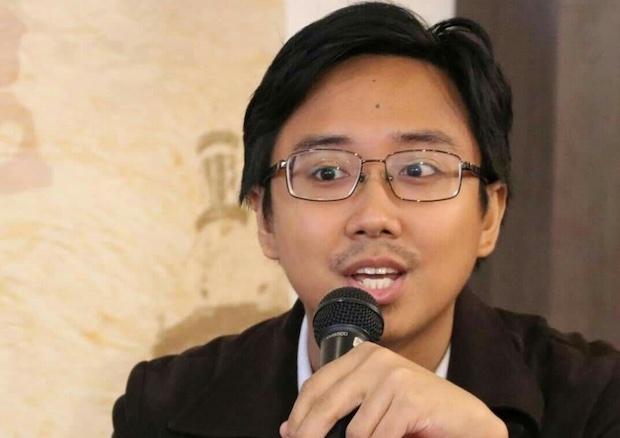Youth rep: With rampant red-tagging, Jose Rizal would have been enemy of state today

Kabataan Rep. Raoul Manuel (Photo from his Facebook account)
MANILA, Philippines — Author and Filipino hero Jose Rizal would have been called an enemy of the state if he were alive today due to his books, a youth party-list representative said of the rampant red-tagging local authors face now.
On Monday’s House session, Kabataan Rep. Raoul Manuel cited a phrase from Rizal — writings which he said would be banned just as officials of the Komisyon ng Wikang Filipino (KWF) demand the banning of particular literature as subversive.
“Let me begin by saying, ‘the idols will be shattered, tyranny will crumble like a house of cards, and liberty will shine out like the first dawn.’ These phrases are not mine, nor are they from a guidebook for subversives or rebels,” Manuel said.
“These are words from national hero Jose Rizal. But if he were alive today, for sure he would be branded as an enemy of the state and his writings would be banned. In connection to this, we slam the renewed state-sanctioned book purging drive, this time initiated by the Komisyon sa Wikang Filipino,” he added.
Manuel also asked whether Rizal and his fellow hero, revolution group Katipunan co-founder Andres Bonifacio would be censored or considered terrorists if they were alive today — even if they are espousing pro-Filipino ideas.
“Bilang isang kabataan, hindi ko lubos maisip na ang ilan sa mga pinagdaanan ng mga Pilipino dati, na nababasa ko lang o mapapanood sa mga documentary — gaya ng censorship ng mga libro, pag-demonize sa mga manunulat at akademiko, at pagbansag sa kanila bilang supporter ng mga subersibo o terorista — ay masasaksihan naming mga kabataan in our lifetime,” the lawmaker said.
(In my youth, I couldn’t bear to think that some of the things Filipinos went through in history would be seen in documentaries, such as the censorship of books, the demonization of writers and academics, and the labeling them as supporters of subversive groups or terrorists.)
“Kung gagamitin ang standards na mayroon tayo ngayon, terorista na rin ba si Jose Rizal, pati si Andres Bonifacio? Kung terorismo ang pagsusulat ng mga librong may nilalaman na pumupuna sa mga nasa posisyon, dapat na rin bang ipagbawal at sunugin ang mga kopya ng Noli Me Tangere at El Filibusterismo?” he asked.
(If we used the standards we have today, would Jose Rizal and Andres Bonifacio be terrorists? If terrorism is writing books that contain criticism of those in power, should we stop the publication and burn the copies of Noli Me Tangere and El Filibusterismo?)
Last Friday, several groups, including the University of the Philippines’ Departamento ng Filipino at Panitikan ng Pilipinas and the Makabayan bloc which Manuel is a part of having condemned broadcast company SMNI and the National Task Force to End Local Communist Armed Conflict (NTF-ELCAC) for allegedly red-tagging Filipino authors and the KWF.
KWF officials including Chairperson Arthur Casanova were accused of allowing the publishing of books with subversive content, an allegation that Casanova denied.
READ: KWF chair, language orgs decry red-tagging of books, authors
According to him, all the books labeled subversive by his own KWF underwent scrutiny during their review process. He also noted that the comments made during the SMNI program might have already been stepping on the boundaries of free speech.
On Thursday, it was reported that the KWF tagged five books as subversive for allegedly promoting anti-government ideologies, as they contained “political, subversive and creative literary works with subliminal ideologies that encourage to fight the government.
The directive was issued by KWF commissioners Carmelita Abdurahman and Benjamin Mendillo, ordering the Sentro ng Wika at Kultura (SWK) to cease printing the said books.
READ: Language agency joins book purge, tags 5 ‘subversive’ works
Manuel believes the act of hindering the youth’s access to these books is part of historical distortion and the chilling effect of the Anti-Terrorism Act of 2022.
“Ang paghadlang na maging abot-kamay para sa mga kabataan at taumbayan ang impormasyon at mga kwento na bunga ng mga karanasan natin, nangyari man iyan ilang taon o ilang dekada ang nakalipas, ay bahagi ng historical distortion. Clearly, the Terror Law is being used to aid historical distortion. The Anti-Terror Law has become an Anti-Truth Law,” he said.
(Hindering people’s accessibility to information and stories stemming from our experiences, whether they happened a few years ago or many decades ago, is part of historical distortion.)
“Moving forward, we can take control of our future by taking back our past: we ensure accountability by combating historical distortion in schools, libraries, communities, and the streets,” he added.